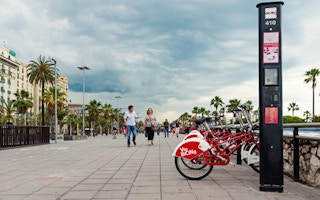If you want to know what we have to do to avoid catastrophic climate change, 17 of the world’s leading climate scientists have worked out a simple but challenging solution: the world, they say, must turn by mid-century into a zero-carbon society.
The signatories to today’s “Earth Statement” say: “This trajectory is not one of economic pain, but of economic opportunity, progress and inclusiveness. It is a chance too good to be missed.
“The latest science indicates that there are critical thresholds in the Earth system. Transgressing them may lead to dramatic and irreversible environmental changes.
“We are probably edging very close to such thresholds, and may already have crossed one with regard to melting of parts of Antarctica. Sea-level rise of more than one metre due to this event alone may be inevitable.”
“
We would never consider this level of risk in any other walk of life, yet we seem prepared to take this risk with our planet. Conversely, the scientific evidence shows that we can create a positive future, but only with bold action now.
Johan Rockström, chair of the Earth League
Window of opportunity
They are convinced that time is short. “The window of opportunity is closing fast,” says Johan Rockström, chair of the Earth League, an international group of scientists from leading research institutions working on issues caused by climate change, natural resource depletion, land degradation and water scarcity.
“We are on a trajectory that will leave our world irrevocably changed, far exceeding the 2°C mark. This gamble risks disaster for humanity, with unmanageable sea-level rise, heat waves, droughts and floods.
“We would never consider this level of risk in any other walk of life, yet we seem prepared to take this risk with our planet. Conversely, the scientific evidence shows that we can create a positive future, but only with bold action now.”
The 2°C threshold is the limit beyond which world leaders have agreed to prevent global temperatures rising as climate change intensifies.
The Earth League’s first Earth Statement is issued as a warning ahead of the UN climate conference in Paris in December − referred to by the UN Framework Convention on Climate Change as COP21, the 21st conference of the parties to the original climate treaty.
The League is supported in its statement − published today to mark Earth Day, an annual reinvigoration of the global environmental movement − by the Global Challenges Foundation.
Professor Jeffrey Sachs, director of the Earth Institute at Columbia University, US, and one of the authors of the statement, says: “COP21 is the moment of truth − the last chance to stay within the 2°C upper limit.
Quality of life
“The key to success is deep decarbonisation by mid-century. Our studies show that this can be accomplished, at modest cost, and with a significant improvement in the quality of life.”
The Earth Statement lists what it calls “eight essential elements of climate action”, which it says any agreement achieved in Paris in December should achieve in order to provide the world with a good chance of avoiding dangerous climate change.
They include the need for the process of deep decarbonisation to start immediately. One of the eight points, which may prove contentious, reads: “Equity is critical. Every country must formulate an emissions pathway consistent with deep decarbonisation.
“For the sake of fairness, rich countries and progressive industries can and should take the lead and decarbonise well before mid-century.”
Prof Rockström and Prof John Schellnhuber, a fellow Earth League member and director of the Potsdam Institute for Climate Impact Research, will present the Earth Statement tomorrow at the fourth Nobel Laureates Symposium on Global Sustainability in Hong Kong.

















